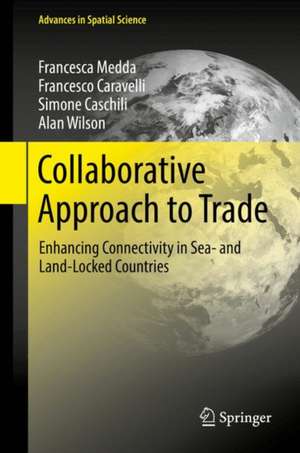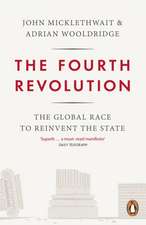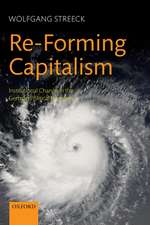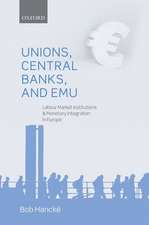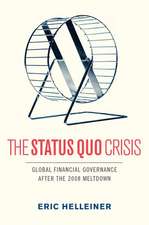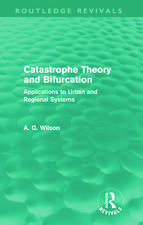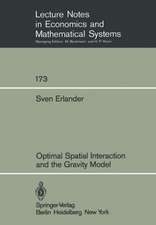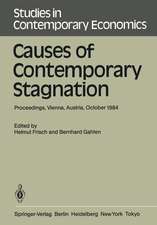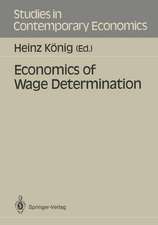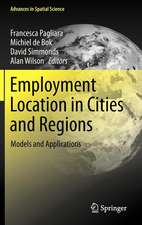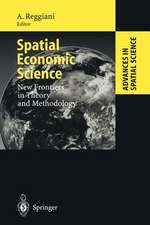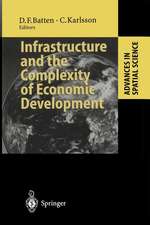Collaborative Approach to Trade: Enhancing Connectivity in Sea- and Land-Locked Countries: Advances in Spatial Science
Autor Francesca Romana Medda, Francesco Caravelli, Simone Caschili, Alan Wilson Geoffrey J.D. Hewings, Peter Nijkamp, Folke Snickarsen Limba Engleză Hardback – 2 mai 2017
| Toate formatele și edițiile | Preț | Express |
|---|---|---|
| Paperback (1) | 724.32 lei 6-8 săpt. | |
| Springer International Publishing – 21 iul 2018 | 724.32 lei 6-8 săpt. | |
| Hardback (1) | 730.35 lei 6-8 săpt. | |
| Springer International Publishing – 2 mai 2017 | 730.35 lei 6-8 săpt. |
Din seria Advances in Spatial Science
-
 Preț: 368.92 lei
Preț: 368.92 lei - 18%
 Preț: 963.47 lei
Preț: 963.47 lei - 18%
 Preț: 948.16 lei
Preț: 948.16 lei - 18%
 Preț: 947.67 lei
Preț: 947.67 lei - 18%
 Preț: 940.72 lei
Preț: 940.72 lei - 18%
 Preț: 954.45 lei
Preț: 954.45 lei - 15%
 Preț: 646.62 lei
Preț: 646.62 lei - 18%
 Preț: 959.50 lei
Preț: 959.50 lei - 18%
 Preț: 956.33 lei
Preț: 956.33 lei - 18%
 Preț: 949.23 lei
Preț: 949.23 lei - 15%
 Preț: 646.75 lei
Preț: 646.75 lei - 15%
 Preț: 643.99 lei
Preț: 643.99 lei - 18%
 Preț: 955.40 lei
Preț: 955.40 lei - 15%
 Preț: 643.00 lei
Preț: 643.00 lei - 15%
 Preț: 644.49 lei
Preț: 644.49 lei - 18%
 Preț: 953.35 lei
Preț: 953.35 lei - 18%
 Preț: 956.03 lei
Preț: 956.03 lei - 15%
 Preț: 647.27 lei
Preț: 647.27 lei - 15%
 Preț: 638.24 lei
Preț: 638.24 lei - 18%
 Preț: 961.23 lei
Preț: 961.23 lei - 18%
 Preț: 954.93 lei
Preț: 954.93 lei - 15%
 Preț: 643.48 lei
Preț: 643.48 lei - 18%
 Preț: 955.70 lei
Preț: 955.70 lei - 15%
 Preț: 650.86 lei
Preț: 650.86 lei - 15%
 Preț: 650.04 lei
Preț: 650.04 lei - 15%
 Preț: 648.42 lei
Preț: 648.42 lei - 18%
 Preț: 949.42 lei
Preț: 949.42 lei - 18%
 Preț: 960.30 lei
Preț: 960.30 lei - 18%
 Preț: 948.29 lei
Preț: 948.29 lei - 18%
 Preț: 958.07 lei
Preț: 958.07 lei - 18%
 Preț: 950.66 lei
Preț: 950.66 lei - 18%
 Preț: 956.03 lei
Preț: 956.03 lei - 15%
 Preț: 643.65 lei
Preț: 643.65 lei - 18%
 Preț: 956.99 lei
Preț: 956.99 lei - 18%
 Preț: 956.81 lei
Preț: 956.81 lei - 18%
 Preț: 958.73 lei
Preț: 958.73 lei - 18%
 Preț: 959.98 lei
Preț: 959.98 lei - 18%
 Preț: 952.40 lei
Preț: 952.40 lei - 15%
 Preț: 643.00 lei
Preț: 643.00 lei
Preț: 730.35 lei
Preț vechi: 890.66 lei
-18% Nou
Puncte Express: 1096
Preț estimativ în valută:
139.77€ • 145.38$ • 115.39£
139.77€ • 145.38$ • 115.39£
Carte tipărită la comandă
Livrare economică 14-28 aprilie
Preluare comenzi: 021 569.72.76
Specificații
ISBN-13: 9783319470382
ISBN-10: 3319470388
Pagini: 211
Ilustrații: XXII, 222 p. 28 illus., 13 illus. in color.
Dimensiuni: 155 x 235 x 16 mm
Greutate: 0.52 kg
Ediția:1st ed. 2017
Editura: Springer International Publishing
Colecția Springer
Seria Advances in Spatial Science
Locul publicării:Cham, Switzerland
ISBN-10: 3319470388
Pagini: 211
Ilustrații: XXII, 222 p. 28 illus., 13 illus. in color.
Dimensiuni: 155 x 235 x 16 mm
Greutate: 0.52 kg
Ediția:1st ed. 2017
Editura: Springer International Publishing
Colecția Springer
Seria Advances in Spatial Science
Locul publicării:Cham, Switzerland
Cuprins
Preface.- Part I: The Challenge and the Science.- Part II: The South Pacific Island Countries (SPICs).- Part III: Uganda.- Part IV: Conclusions.
Notă biografică
Francesca Romana Medda is a Professor of Applied Economics and Finance at the University College London (UCL). From 2010 she is the Director of the UCL QASER (Quantitative and Applied Spatial Economics Research) Laboratory. Since 2012 she serves as economic adviser to the UK Ministry of Environment and Agriculture (Defra) and in 2014 at the Ministry of Finance (HM Treasury). She is Vice-President of the Parliamentary and Scientific Committee. Her research focuses on project finance, innovative financial mechanisms and risk evaluation in different infrastructure sectors such as: transport industry, energy innovation and new technologies, urban investments (smart cities), supply chain provision and optimisation, and efficiency. Her work is published in leading academic and practitioner journals. She has worked and works actively with the private and public sector including The European Investment Bank, The World Bank, UNESCO, UN-Habitat, WILLIS Re, HALCROW, and UITP.
Francesco Caravelli is a theoretical physicist, interested in quantum and classical systems and the application of techniques of statistical physics and complexity to other disciplines such as economics and engineering. He is currently a Senior Researcher at Invenia Lab, a honorary member in the Computer Science Department at University College London and a visitor of the London Institute for Mathematical Sciences.
Simone Caschili, enviromental engineer, received his Ph.D. in Ingegneria del Territorio (Land Engineering and Urban Planning) at University of Cagliari (IT) in February 2010. His research interests are the modelling of urban and regional systems as complex networks, the inclusion of time-space features in network modelling and policy evaluation for planning in both urban and environmental governance.
Textul de pe ultima copertă
This book applies regional analysis to the challenges facing global investment agencies seeking to enhance trade in lagging regions. It shows how spatial interaction and agent-based modelling can be used as the basis for developing new plans and policies. An in-depth analysis of trade routes is presented, which can be used to develop policies for increasing efficiency and reducing costs. Landlocked Uganda and the sea-locked South Pacific Islands serve to illustrate the problems of covering sizable distances, accelerating export flows and improving supply chain efficiency. These examples also provide an excellent illustration of the power of regional science, from assembling data bases in difficult situations to developing and applying models of the trade system.
Caracteristici
Presents a practical approach to modelling international trade in lagging regions Demonstrates applications of the tools of regional science Provides an introduction to practical agent-based and spatial interaction modelling Includes supplementary material: sn.pub/extras
